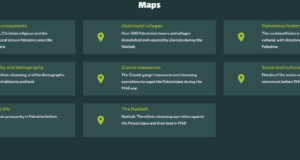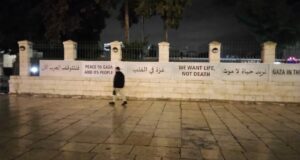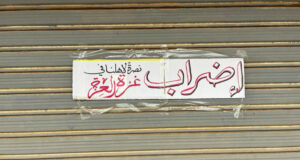By Harrison Healy
Palestine Pal.
Last week was a conference on “International Struggle Against the Occupation of Palestine” held in Bil’in. Unfortunately, many of the ISM and IWPS (International Woman’s Peace Service) activists in Palestine including myself, were unable to attend due to an “incursion” taking place in Balata refugee camp. Balata Refugee camp is basically a cramped suburb of Nablus although people here always see the areas as separate. It has a population of about 30,000 crammed into 2 square kilometers. Many refugees from the 1948 Al Nakba (catastrophe), and others displaced from 1967 ended up in Balata.
It doesn’t fit your standard vision of a refugee camp. Unlike those temporary ones that you often see on television with tents etc. The displacement has become permanent for these people and a whole impoverished town has been set up. According to the Palestine monitor one fifth of all civilians and fighters who have died at the hands of the Israeli government, since the second Intifada come from this place. Unlike Ramallah where the majority of posters around were for the elections, here they were martyr posters and memorials.
The entire refugee camp was under curfew when I arrived on the second day of the “incursion”. The Army had instructed people not to leave their homes. All the shops were shut but people roamed the streets in open defiance of the curfew. Many people didn’t feel safe so they stayed at home, peering out of their windows. Before I had even made it to the camp 2 boys had been killed on the roof of their house by a sniper. The Israeli army frequently occupies houses in Balata(even when not involved in a full on “incursion”). They hold families hostage to prevent the houses from being attacked. During the invasion there were 5 occupied houses. Jeeps were driving up and down the street. This is all despite Nablus and Balata being Area A, meaning that after Oslo these areas were supposedly meant to be under the control of the Palestinian Authority.
Still all the Israeli Army need to do is contact the Palestinian Authority and instruct their police to get out and they have to comply. Jeeps moved up and down the streets of Balata whilst tanks surrounded the perimeter. I was working with the Palestinian Medical Relief Committee (UPMRC), an initiative which sees Palestinians working as medics, giving them something constructive to do in a situation that makes you feel really helpless. We were walking around on patrol with the UPMRC, helping them get medicine to sick people and carrying people to Ambulances. During a patrol we bumped into someone who had just been hit in the head with a rubber bullet and was bleeding. Someone else had just been shot with another rubber bullet in the leg. It felt like being in back in St. Johns Ambulance when I was a kid only we weren’t dealing with cricket injuries or some guy who just got a bit too drunk.
The Ambulance’s rather then carrying non-smoking signs, had a no rifles sign. We were waiting for the inevitable casualties. Sometimes we would be out on patrol and at other times we were waiting in the Medical bay. We sat and talked about all sorts of things, joking around and ate a lot of chocolates like I used to do as a first aider waiting for something to happen. Only this sitting around and doing nothing was occurring with the background noise of large explosions and tear gas occasionally filling the room.
We tried to get medicine to one family but the tanks tried to stop us at every road, instructing us to turn back. We had to Indiana Jones style run past a tank on a major road and climb over a stone barrier the army put in place to get back into Balata and deliver the medicine. We lost one of our team in the process who didn’t quite make it. Thankfully he made it around another way.
That night, we were debriefing we heard gun fire across the road. A man was shot by a sniper whilst watching television in his home across the street from the medical centre. The army was hesitant to let the ambulance pass, they did so after much coercion. The man was shot in a major artery and was loosing a lot of blood. At that time we weren’t sure they hadn’t hit him in the heart. The ambulance passed as family members screamed, even a few of the ambulance workers became really angry towards the soldier in the jeep. But it wasn’t useful, we needed to get this person out and so we powerlessly carried the stretcher past an Israeli armored car. They weren’t even after this person. Shortly after a women in the family went into labour and we also had to rush her to an ambulance.
But the story doesn’t end there. The army then forced the family out of their home. The ambulance crews, myself and another international waited with the family outside. After half an hour in the cold, the army tried to instruct us to leave the family there. We refused and they pointed rifles at us from the jeep, placing the laser sight on my fore head. They also constantly gestured that they would throw grenades of some description out of the car.
Despite these threats we didn’t leave, the soldiers threatening to return in one minute. After this threat didn’t eventuate the family returned to their home. The family were so generous that despite just having their son shot they tried to offer us tea. We slept that night in the medical centre and I ended up on the early morning patrol. The narrow entrances to Belata camp were now all closed off. We managed to get out by traveling through a friends house but it wasn’t easy. The army prevented all but one of the ambulances from entering Balata so we would have to carry people to that ambulance or to the edge of the camp.
On the way back from our patrol we bumped into a man who had just had his house searched. Apparently his son was one of the men the army was “interested in.” This search demonstrated no respect for the family or their possessions. Electrical equipment was dismantled and left on the floor, wardrobes were emptied, their clothes and draws scattered across the room. The man inside wanted to spend ages talking to us, he was saying things about Jewish conspiracies and stuff that I find offensive, but how do you criticize a man who has just had his home raided, had everything he owns smashed and is having his son hunted by the “Jewish State” for being racist (let alone the incursion and all the previous problems in Balata).
We responded to distress calls from more people that day some had been shot, an old women who had trouble breathing because of the tear gas. We ended up going into an occupied house because we heard that one of the medical team had been kidnapped. It turned out that he was just giving medicine to a diabetic person. When we were in the occupied house my friend talked to one of the soldiers about where he was from in Israel etc. The soldier was clearly upset and we could tell he didn’t want to be there.
We tried to get into another occupied house where we heard someone was injured. We couldn’t get there because a soldier outside threw a sound bomb at us and threatened to shoot us if we moved closer. We found out later that person was ok. Many people were injured and some were killed, several people were also arrested. According to residents of the camp despite all the Israeli Army’s talk of needing to arrest fighters none of the people they were after had ever been involved in attacking past the green line or even attacking Israeli settlements or checkpoints. They were primarily defensive fighters, who fought back when the army attacked.
Finally the army withdrew from 4 of the 5 houses and all of the jeeps left. One of the boarder police jeeps came back to remove their people from the last house. They came in guns blazing and shot a kid in the head with live ammunition. They drove off Tuesday afternoon, none of us were sure when they would return.
I went back to Ramallah before the second invasion started however I came back later in the week for the funerals.
The people of Balata gathered for the funeral of those that had died in the incursion.. Statements from the various Palestinian factions were passed around those gathered stating what they thought that the deaths meant in terms of the ‘peace process’ about the need to resist the occupation etc. They put these deaths into the broader context of the occupation,
Far from it being taboo to talk politics at the funeral or discussing the details of death the people of Balata are so used to it that they will share what ever information they can at such times.
After the funeral we were taken around to a house where some of the fighters were killed. The army surrounded the house and exploded everything inside killing the fighters who were hiding in the roof. Palestinians are aware that the choice to become a fighter is the reality that they will either die young or face life in prison.
We then proceeded to the hospital where we met many of the people that were injured during the “incursion.” Many of them were just young kids shot with live rounds.
 International Solidarity Movement Nonviolence. Justice. Freedom.
International Solidarity Movement Nonviolence. Justice. Freedom.










